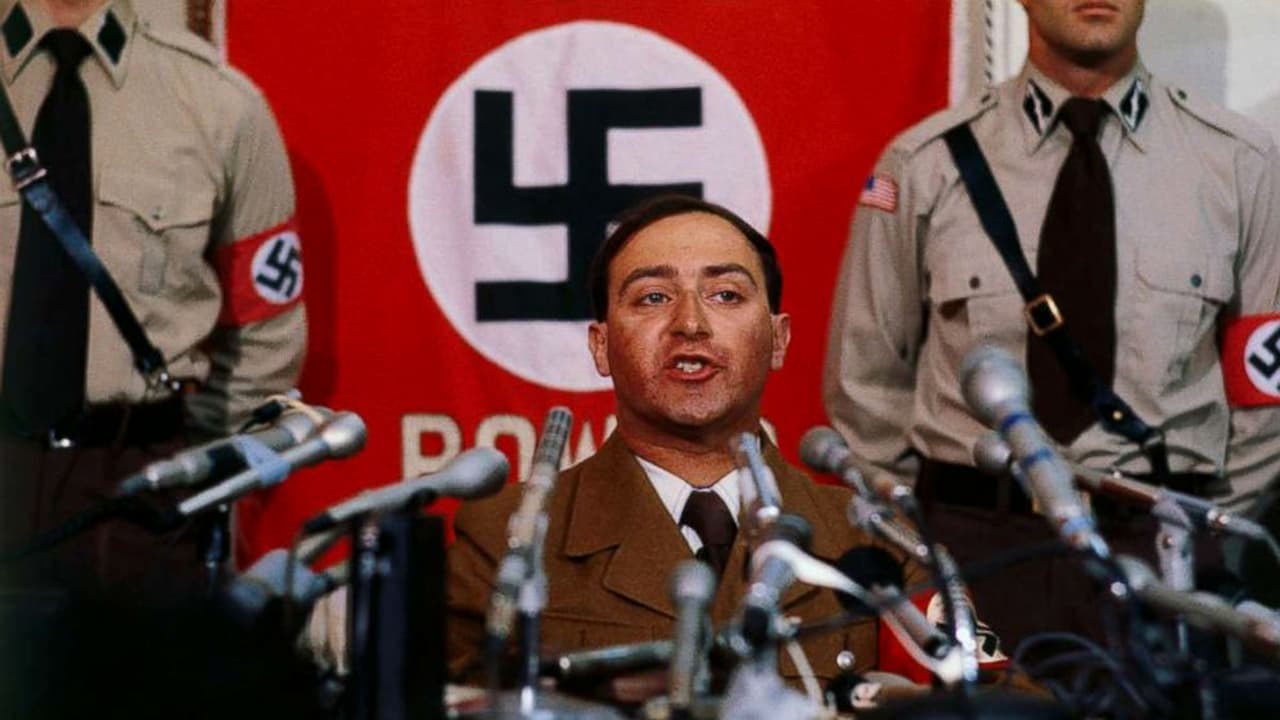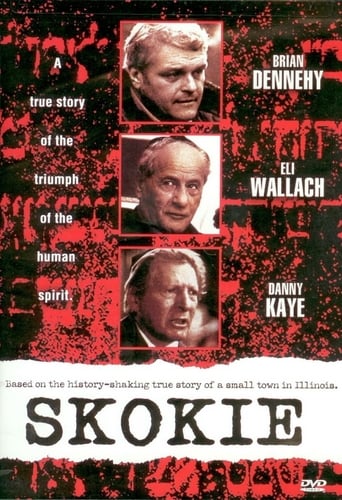

One of the better TV movies ever made about a current political issue. The issues are dramatized vividly - freedom of assembly vs. the rights of a community. The performances are consistently excellent. I would especially cite Danny Kaye, whose portrayal of quivering outrage is one of the great moments of his wonderful career. I was interested to read about the career of the screenwriter, Ernest Kinoy. Among his many credits are a couple of episodes of the excellent short-lived series "The Senator" (part of "The Bold Ones"), very much a "ripped from the headlines" series. So too with this movie.
... View MoreDeep thinkers will be fascinated, appalled and intrigued, all those reactions at the same time, with "Skokie", movie based on a true story that for the most part we wished it could be an very imaginative fiction. It retells the events surrounding an American Nazist group who decided to march on the streets of Skokie, a town whose majority of habitants consists of Jewish people, most of them Holocaust survivors. If only the story would stop right there because you already have one major conflict to give your food for thought. There's a whole tension involved, politically specially, since the town's mayor is trying to make anything to secure his citizens that such march won't occur and if it does happen no violence will take place. The Nazi leader (George Dzundza) says it's his right as an American citizen to have his free speech; the Jewish community are really afraid of such atrocious act, harmful enough just in being thought about it; and they already made clear that if that march occur they won't stand there peacefully, they'll react against it with all of their forces. As one of the most respected leaders (Danny Kaye) says: "We'll attack them with baseball bats!". The case goes to court where it will be decided if such rally is valid or not and if hurts the freedom of speech rights. This is where the story gets really interesting, unbelievable yet it's the truth, one of those life ironies that can't be easily understood: the American Nazi's decided to file a lawsuit against the Jewish community of Skokie by calling on their behalf the American Civil Liberties Union (ACLU) to help them, and they're getting represented by a Jewish lawyer (John Rubinstein) who firmly believes that the law must be respected above all, he sees that there is interference with free speech and he decides to go forward with this process, which goes against what most of his associates think, creating a difficult problem in the union since the majority of people who support them are Jewish just like him and they wouldn't want to be known as the ones who defended people who go against everything they are and stand for.Only with such plot and presentation of facts "Skokie" would already be something to be seen. But the cast makes it more involving, a true must-see. Carl Reiner, Eli Wallach and Brian Dennehy are great in the supporting roles, and veteran Lee Strasberg steals the show with just one scene in one of his final performances. But the main focus of our attention is comic Danny Kaye, playing a dramatic role of many dimensions, a man who went through a lot in his life, only trying to live peacefully but when hearing about the rally he's very vocal against it, and decides he won't tolerate that. Some find his performance a little over-the-top but it's not. It's very effective, one of the greatest things about this film. Here's a quality TV film, very well made and with plenty of things to say about ethics, laws interpretations (they're never so black and white/right or left as one can imagine it is). The whole argument of what free speech really is and the rights of certain groups against others, it's very provoking to see and deal with it. 10/10
... View MoreDanny Kaye again showed his talents as a brilliant dramatic actor in this 1981 television movie.He plays a Holocaust survivor who has settled in Skokie, Illinois after the war. Skokie has become a predominantly Jewish town and the serenity of the area is threatened with the Nazi garbage threatening to march through the town to cause the reopening of nightmarish wounds, fear and trepidation among the Jewish citizenry of the town.As the spokesman, Kaye conveys those fears but is adamant that the garbage shall not march. His voice is etched with unbelievable feeling as he will do anything in his power to thwart the threatened march.As the Nazi leader leading such a march, George Dzundza is quite effective as Nazi Frank Collin. Filled with hatred, and contempt for humanity, Dzundza also etched an unforgettable character. Of course, the picture belongs to Kaye and he received an Emmy nomination for best actor for it.There is only so much that an afflicted people can take- 1st amendment rights or not.
... View MoreOne day in November 1980 my mother phoned my Chicago office. She had read a newspaper report about a call for TV movie extras being held that evening at a Skokie auditorium. The proposed film, titled Skokie, would detail the late 1970's effort by the Chicago suburb to prevent a march in its large Jewish community by a neo-Nazi group. Although I then lived in Skokie, I had only heard about the commotion through the media.I fantasized about starring in a movie despite having no acting experience other than grade school plays. Having accumulated much vacation time I was able to take off from work. So I attended the call not knowing what exactly to expect. The long lines moved rather quickly. The interview itself was short, and people were preferred who simply could fit and dress themselves for the part. For example, in real life I was a lawyer, so they assigned me to a court room scene where I played a second assistant attorney.Extras had no speaking role, but you can see me sitting near Eli Wallach for about 10 minutes, which shoot took two days at a courthouse in Evanston, Illinois. Between takes, extras observed the intricate technical proceedings and got to chat with many of the cast and crew on the set. Makeup was frequently applied to our faces covering up five o'clock shadow or sweat. We were fed a light breakfast and full lunch, but dinner hour came and went. Certain actors kept forgetting their lines, tempers flared as the evening wore on. At the end of the first day as we were reminded to wear the same clothes for the next day's finish, one man jokingly asked if we could at least change our underwear.Several of us extras, especially those who were prompt and didn't complain about the long schedules, were asked to be in additional scenes. I appeared in two town meeting sequences filmed in a Skokie synagogue, and in a political rally where we sang patriotically in front of the actual Skokie village hall. Skokie's mayor visited us and greeted the actor portraying him, Ed Flanders, later Dr. Westphall of St. Elsewhere. Many extras were in fact concentration camp survivors living in Skokie. There was an authentic intensity underlying the crowd scenes so the "acting" seemed for real.When I first viewed the movie, telecast on CBS in 1981, I focused strictly on searching for myself. Only mom recognized me at every shot even catching one I missed. My other family and friends concentrated on the story. Using a Betamax I taped the program, eventually putting it away with my other mementos. In 2003, while browsing a video store, I discovered the Skokie DVD and snatched the two shelf copies. I found the disc quality superb and located every semblance of my younger self. In comparison I played the tape and was shocked at how badly it had deteriorated. DVDs are hoped to have a longer life.Of course the movie Skokie has its flaws. But in retrospect the melodramatic moments seem very true. The film illustrates the dangers to yourself when the rights of others are assaulted. Experiencing Skokie, I felt aware. Watching Skokie, so might you.
... View More